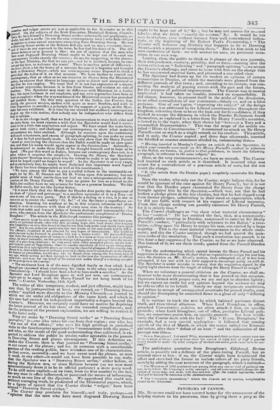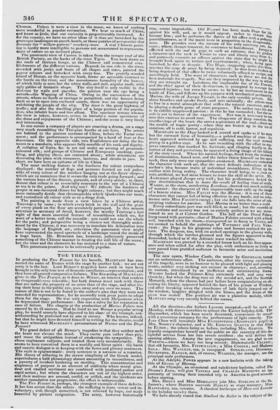PANORAMA OF CANTON.
MR. BCRI'011D could not have catered better Or the amusement of the holyday visiters to his panorama, than by giving them a peep at the
Chinese. Unless it were a view in the moon, we know of nothing more wonderful in popular estimation. We hear so much of China, and know so little, that our curiosity is proportionably increased. As for the country, we have no other ideas of it than are furnished by the grotesque landscapes on punch-bowls, or those puzzles of perspective that decorate the " willow-pattern" crockery-ware. A real Chinese paint- ing is hardly more intelligible to persons not accustomed to representa- tions of nature on an inclined plane. The panoramic view of Canton is taken from the terrace roof of the British Factory, on the banks of the river Tigris. You look down on the roofs of thirteen lump, as the Chinese, call commercial esta- blishments of the different nations. Beyond, on one side is the river, crowded with junks and boats of all shapes and sizes, painted the ayest colours and bedecked with every hue. The prettily-wooded island of Honan, on the opposite bank, forms an agreeable contrast to the bustle on the river, and the monotonous formality of the houses, of which little is seen but the white walls, and dull, angular roofs, with ugly gables of fantastic shape. The city itself is only visible in the distance by walls and pagodas, the portion near the eye being a suburb—the Wapping of China. Owing to the narrowness of the streets, where no horde or carriage is permitted, and the houses being built so as to open into enclosed courts, there was no opportunity of exhibiting the pe,ople of the city. The river is the great highway of traffic; and also the dwelling.place of a large portion of the popula. tion, who inhabit boats and live afloat. The spacious terrace whence the view is taken, however, serves to introduce some specimens of the dress and enjoyments of the Chinese ; and the scene is very lively and interesting. In one corner a company of players are enacting a drama, on a stage very much resembling the Thespian booths at our fairs. The actors are habited in the ancient costume of China, before the Tartar con- quest ; and the performance is accompanied by a band of four or five musicians. On the opposite side, two Englishmen are doing the ho. nours to a mandarin, who appears fully sensible of his rank and dignity. A collation of fruits, &c. is set out under an awning of geranium.' coloured silk ; and groups of Chinese and Europeans smoking, gam- bling, and playing chess, are scattered about; while attendants are decorating the place with streamers, lanterns, and shrubs in jars. In short, we have here an epitome of life in China. The most striking feature is the fondness for colour everywhere displayed : the number of flags and pennons hoisted on red poles ; silks of every colour of the rainbow hanging out at the dyers' shops— which are so numerous that it seems the only trade going forward ; and the various hues of the dresses, parasols, and of every article, in short, denote that colour is as essentially necessary to the eye of a Chinese as tea is to the palate. And why not? We ridicule the fondness of people in sun-favoured climes for bright colours; but they might much snore rationally deride that chromophobia which Quakerizes our taste, and neutralizes all colour with us to a dingy drab.
The painting is made from a view taken by a Chinese artist, TOONEQUA by name ; in which every brick in the wall and the grain of every plank on the floor are accurately portrayed. In this minute attention to accuracy of detail, however, the worthy TOONEQUA lost sight of that more essential feature of resemblance which we, for
want of a better term, call the ensemble : you could not see the whole for the parts ; and perspective being a science not thoroughly under- stood by the Chinese, it was necessary to translate his delineation into the language of English art ; otherwise the panoramic view might have represented the novel spectacle of a landscape round the inside of a huge basin. Mr. Buaeoeis has, however, judiciously preserved something of the Chinese manner in treating the still life of the acetic; but the trees and the elements be has restored to a state of nature.
This panorama promises to be universally popular.



























 Previous page
Previous page